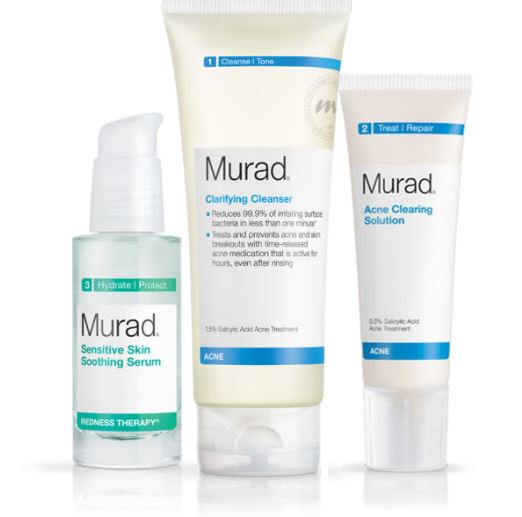How do you treat acne if you have a very sensitive skin? Learn about the best treatments options including how you can cleanse and tone it. We have also covered the best products to use and those to avoid.
People who have sensitive skin often react to most of the acne treatments i.e. their skin may react and become excessively dry or get irritated. However, with the correct choice of treatments as well as following the right procedure, you can still have a sensitive type of skin that is vibrant, glowing, and without any blemishes.
As you know, a glowing and vibrant skin makes you look younger, prettier, excited, more confident and in control of your life. Of course, if you have this type of a skin, whether it has acne or not, you need to use the right cleansing, exfoliating, toning and moisturizing products to ensure it is vibrant. However, if you have acne, here are the right treatments including steps and products:

Cleaning and acne prone sensitive skin
Table of content
You need to pay special attention when dealing with acne without irritating or making it dry. You do not want to use products that will leave a stinging, tingling or burning feeling. The rule of the thumb is to ensure all the products you use i.e. cleansing, toning, moisturizing and exfoliating are gentle and HYPOALLERGENIC.
Here are steps to follow:
Step 1: Cleansing
The first step to success lies in cleansing. To effectively deal with acne, avoid harsh cleansers i.e. when washing it, go for gentle cleansers and face washes for sensitive skin. It is very important that you do not use soaps. Instead, always go for hypoallergenic cleansers that do not have soaps. Cleansers such as Cetaphil Daily Facial cleanser will not disrupt its normal pH or strip away natural oils.
Always ensure it is clean.e. use a hypoallergenic cleanser or a mild body wash it twice a day. This will ensure it does not dry or become oily.
Furthermore, when cleansing your face, use a new soft cotton tissue or terry washcloth each time to avoid further adding unwanted bacteria while cleaning your face.
Step 2: Exfoliation
Although exfoliation is very important for most skin types, you need to be keen when exfoliating. Ensure you do not use gritty exfoliants i.e. avoid using coarse cleansing pads or scrub. If possible, avoid exfoliation since it will eliminate the intact natural oil barrier other than spreading bacteria and thus more acne breakout.
Many people think if they scrub their face, it will banish breakouts and blackheads but this will only worsen the situation other than causing irritations. Scrubbing your face will also result in redness and burning.
Step 3: Toning
When toning your acne prone sensitive skin, go for a non-toxic toner that is hypoallergenic. This will ensure it does not react with the toner.
Step 4: Moisturizing
To help protect your skin, go for hypoallergenic moisturizers or those for sensitive skin that will help heal acne quickly as well as nourish it while keeping it moisturized. Such moisturizers will not irritate it or make it oily.
Step 5: Concealing
To help minimize the appearance of acne while you heal, use hypoallergenic loose mineral instead of concealers as they latter will clog your skin and worsen breakout.
Treatments to avoid
We have seen steps on to follow when cleansing an acne prone skin that happens to be sensitive.
It is important to ensure you avoid salicylic and benzoyl peroxide containing products, as they are likely to inflame it
Furthermore, you should avoid products containing Retin A and aluminum (especially perfumes and deodorants that have aluminum) i.e. when choosing deodorant, go for the hypoallergenic deodorants.
Finally, you should also be careful while using products with alpha-hydroxy-acid, beta-hydroxy-acid (BHA) as they are known to cause redness, burning or tingling sensation as well as irritation.
Finally, to avoid clogging your skin and worsening acne breakout, avoid products, which have Isopropyl Palmitate, sodium lauryl sulfate and Laureth-4, Octyl Stearate.
Natural products and remedies
Use natural ingredients such as tea tree oil and aloe vera gel. Such products have been found to be effective. Furthermore, using lavender oil is great for soothing and healing effect. It has anti-bacterial, decongesting and antiseptic effects. Add a few drops of lavender oil to some water and use it in washing your face.
Modify your diet
Modifying your diet is not just only a way to deal with this problem but also very important in ensuring you are not affected by other diseases and conditions some of which will affect your skin such as psoriasis or eczema.
Avoid foods with lots of toxins and artificial additives and ingredients. The body often gets affected by acne breakouts as it tries to clean itself from such toxins.
Best treatments and products to use
Finally, you can try modern treatments such as LED Light Therapy facials. This has been found to help soothe sensitive skin, heal tissues as well as clam redness and inflammations.
Other treatments such as laser should be tried. However, be careful if you area considering dermabrasion.
You can also try some of the available products. Some of the common products include the following:
- AcneFree Sensitive Skin Acne System
- Murad Acne Kit for Sensitive Skin which has Correcting Moisturizer SPF 15, Gentle Acne Treatment Gel and Soothing Skin Gel Cleanser,
More from this video
Conclusion
I hope the above steps for cleansing, toning, exfoliating and moisturizing will help you. Do not forget eating a good diet, best products to use and those to avoid.
